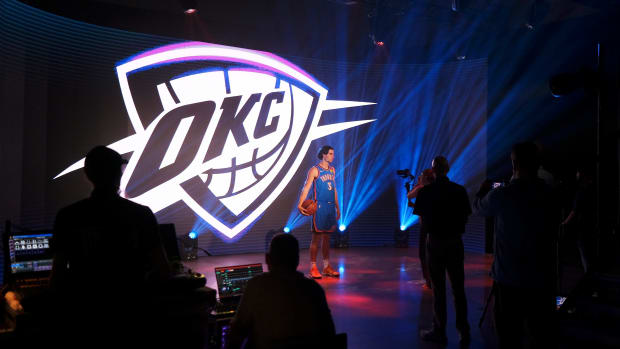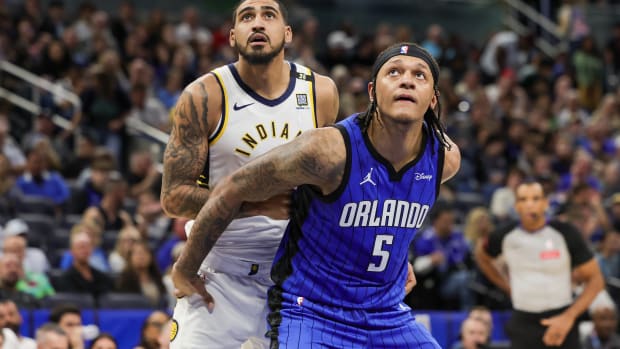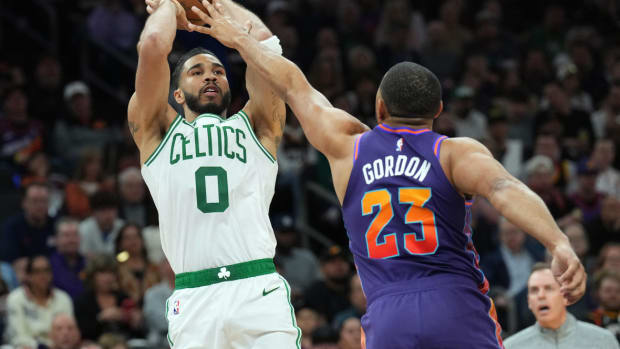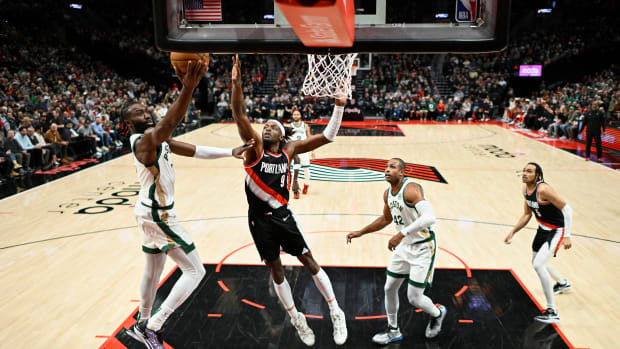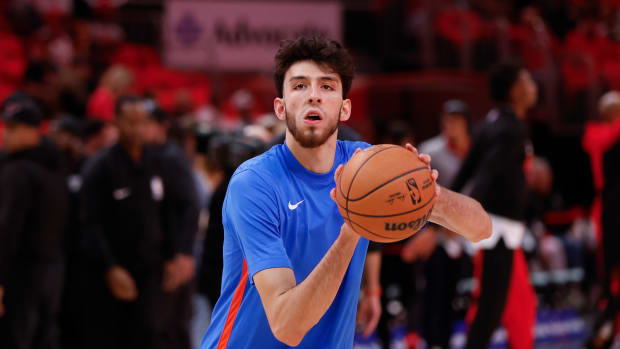
Andrew Wiggins' strange journey from basketball prodigy to trade bait
A little more than a month after the Cavaliers selected Andrew Wiggins with the No. 1 overall pick in the 2014 NBA draft, ESPN interviewed him for a segment on SportsCenter. The segment was, in a word, awkward. At this point, it seemed all but inevitable that Cleveland would be dealing Wiggins to Minnesota for Kevin Love. Four days later, the two teams reached an agreement.
ESPN anchor Bram Weinstein opened with a joke about the No. 21 jersey Wiggins was wearing on TV, suggesting it may one day be a collector’s item. “I hope so, one day,” Wiggins said, missing the point. When the conversation turned to LeBron James’ decision to return to Cleveland, Wiggins was essentially asked to make his case for why James should want to play with him. Weinstein later asked Wiggins what he wanted to happen in regards to his future, which led to the following exchange:
"I just want to play for a team that wants me," Wiggins said. "So whichever team wants me, I'll play for."
“Do you think Cleveland wants you?” Weinstein followed.
“Yeah … I hope so," Wiggins said.
[youtube:http://youtu.be/gy8IpEJ2w9I]
A No. 1 overall pick should never have to wonder whether the team that drafted him wants him. This is an assumption we can safely make pretty much every year. Yet Wiggins arrived in Cleveland amid a unique set of circumstances. Not long after James’ SI.com essay announced his decision to rejoin the Cavaliers, speculation began that Cleveland would seek to deal Wiggins for an established star, like Love, to pair with James.
In a portion of the essay describing how James believed he can improve his teammates, the four-time MVP made no mention of Wiggins. "I think I can help Kyrie Irving become one of the best point guards in our league," James wrote. "I think I can help elevate Tristan Thompson and Dion Waiters. And I can’t wait to reunite with Anderson Varejao, one of my favorite teammates."
Nor had James, according to Wiggins, contacted the No. 1 pick. Wiggins and new coach David Blatt were left to answer questions about the No. 1 pick’s future at summer league. Wiggins talked optimistically about a partnership with James and Blatt said Wiggins was “not going anywhere as far as I know and as far as the club has expressed.”
That talk, it turned out, was for naught. On Aug. 23, the Cavaliers, Timberwolves and 76ers officially struck a trade. The principals of the deal: Wiggins, 2013 No. 1 pick Anthony Bennett and Thaddeus Young were shipped to Minnesota, Love moved to Cleveland and Philadelphia acquired a first-round pick and two players (Alexey Shved and Luc Richard Mbah a Moute) on expiring contracts.
Compared to other unremarkable bundles exchanged in previous superstar deals, the Timberwolves’ return in the Love trade carries the prospect of a solid foundation. Giving up a top-tier talent like Love portends more lean years for a team riding the league’s longest playoff drought, but Minnesota appears to have done well for itself, particularly when you consider the other reported offers it could have pulled the trigger on.
Whether Minnesota is in good shape going forward, though, hinges on one pivotal question: How good is Andrew Wiggins?
***
Wiggins’ reputation as one of the best prospects of the last decade was forged well before he joined the Kansas Jayhawks last year.
A mixtape of Wiggins surfaced when he was 13 years old. His profile soared in 2012 when he outshined fellow first-round pick Julius Randle in a matchup at a summer tournament. Wiggins also dropped 57 points in a high school game after the publishing of a Sports Illustrated article that questioned his motivation and motor. All the while, more ridiculous highlight reels came out and more buzz began to build among media and fans.
SI.com's Top 100 NBA players of 2015
Born to a former NBA player and Olympic medalist, Wiggins was billed as the next great Canadian player and, somewhere along the line, people took to calling him Maple Jordan. There was no shortage of scouts and analysts lining up to wax poetic about his potential. A general manager told ESPN’s Chad Ford in May 2013 that Wiggins would have been the No. 1 pick in every draft since 2007.
Statements like that illustrate how Wiggins began his college career amid an unrealistic set of expectations. As the best player in a strong class of prospects, which also included Jabari Parker, a player SI plastered on its cover and described as “The best high school basketball player since LeBron James,” Wiggins was expected to dominate his college competition. Whenever he “struggled” – whenever his performance fell short of some impossibly high standard – there was a rush to question his standing as the top 2014 NBA prospect.
After just one regular season game, for example, a scout told ESPN’s Jeff Goodman the following about Wiggins. “Great athlete, no way he’s the top pick in the draft. Julius Randle is better. There’s just way too much hype. His skill level is average. He made a few shots but plays straight up and down and doesn’t have any playmaking skills. Everything has to be a straight-line drive. Right now, he’s the third- or fourth-best player for Kansas. He’s long and athletic but has a long way to go.”
Wiggins’ game was repeatedly picked apart. Observers brought new perceived flaws to the forefront and every game was seemingly a referendum on his ability to become a franchise-altering superstar at the next level. One of the main knocks on Wiggins was that he was not assertive offensively and tended to drift out of possessions. This criticism is not unfounded.
“I think that that’s fair,” Kansas coach Bill Self told SI.com, while adding he thought Wiggins improved in this regard as the season progressed. Self added: “I can’t remember a college freshman’s game being evaluated and probably scrutinized any more than his, in large part just due to all the hype that was coming in.
“[Joel Embiid] could have a game where he does the same things that people say that Andrew can sometimes do, float or whatever, and people would say, ‘He’s just a freshman. He’s only been playing three years.’ Andrew could do that and they’d say, ‘Good gosh. He got 18 and 7, but he should have gotten 24 and 12.’ And so, I think, just because of the hype and expectations, that put him in the situation where he was probably critiqued more harshly than most.”
According to Kenpom.com, Wiggins had a usage rate of 25.5 percent last season with Kansas, ranking 312th in the country. Compare that with two elite scorers selected in the top half of the first round, Creighton’s Doug McDermott (32.9) and Duke’s Jabari Parker (31.8). McDermott (124.4) and it becomes clear that Wiggins wasn’t involved as much offensively as some of his peers.
For all the attention Wiggins has garnered for his athleticism, his offensive game lacks polish. His quick first step and leaping ability give him a physical advantage over most every defender he faces, but his long-range shooting remains a work in progress and his ball-handling skills are still developing. And after failing to impose himself offensively in college to the extent his skills suggested he was capable of, it’s fair to question whether he’ll be able to consistently create his own shot off the dribble against NBA defenses. Further, his slight frame could pose issues early in his career against stronger defenders.
Still, it’s too early to typecast Wiggins as a low-usage, complementary offensive piece. At 19 years old, he has years of development ahead of him. It may take a while before Wiggins grows into the sort a top-notch offensive creator, but he’s shown plenty of promise.
“I think it’s more a product of where he’s at skill-wise right now,” said Jonathan Givony, founder of DraftExpress.com. “I think that he showed enough during the year that it wasn’t all that concerning, and I think that that was kind of my personal expectation going into the year. So I wasn’t shocked by the way it played out. It kind of played out the way we thought it would.”
Wolves waited out a prime return in Wiggins, Bennett with Love trade
Where Wiggins shined the most last season – and where he may be able to make the biggest impact right away in the NBA – was on the defensive end. Opposing ball handlers have an extremely tough time shaking Wiggins in the half court, as his lateral quickness and length allow him to cover lots of ground and atone for his missteps. Wiggins is also a terror in transition, with the speed to run past defenders and finish at the rim.
Wiggins finished his lone season at Kansas having broken multiple school scoring records, including the freshman scoring average (17.1 ppg) and the single-game total with 41 points against West Virginia. Given the expectations that attended his arrival in Lawrence, however, it’s easy to see why some were left wanting more. A nickname that evokes the greatest player ever, and headlines comparing him to the greatest player of this generation, didn’t exactly tamper down the hype.
As the draft approached, Wiggins’ game was shined under an even more critical light. Had Kansas teammate Joel Embiid not suffered a foot injury before the draft, there’s a strong chance he would have been picked ahead of Wiggins. Even so, the virtues of Cleveland selecting Wiggins with the No. 1 pick were plain.
The Cavaliers were getting a hyper-athletic wing with enormous two-way upside. Between the realistic choices of Wiggins, Parker and an injured Embiid, Wiggins was considered a solid option with All-Star potential. Weighed against the reaction to Cleveland’s pick of Anthony Bennett at No. 1 last year, there seemed to be relatively few dissenting voices.
“I think that he’s going to continue to get better and better, and I think his ceiling is ridiculously high,” Self said of Wiggins.
Wiggins didn’t disappoint with his play at summer league. He canned pretty stepback jumpers, showed off his 44-inch vertical leap and more than held his own on the defensive end. There was also this chase down block and the spinning baseline jam that almost looked too easy.
Over four games, Wiggins averaged 15.5 points and 3.5 rebounds.
What is realistic to expect from Wiggins as a rookie? Wolves president and head coach Flip Saunders told a Minnesota radio station last week that he had not committed to starting Wiggins. That can be taken to mean that Saunders merely wants to give the appearance that Wiggins will have to fight for his starting job, when in reality, as one of the most anticipated draft picks since James, Wiggins may have a starting spot reserved for him.
At the same time, the Timberwolves are not short on serviceable options on the wing. Corey Brewer and Kevin Martin are among those who could cut into Wiggins’ playing time. Yet Wiggins should still be in line to receive a healthy allotment of minutes, if only because the Timberwolves will be eager to see what one of their purported building blocks is capable of providing early in his career.
Said one NBA scout of Wiggins, “(He’s a) freak athlete, has a lot of things he needs to work on to become better, but he’s got a chance to be pretty good. Like most guys coming into the league, (Wiggins has) to understand the NBA game, he’s got to understand how to play, how to play with people.”
Summer of Kyrie: Irving's Cavaliers go from punchline to powerhouse
The label of No. 1 pick is, in itself, a burden. Wiggins will be able to ask new teammate Anthony Bennett about just that. Wiggins will be subjected to the same strain of comparative analysis, only the standard of acceptable performance will be set even higher than it was for Bennett.
However, unlike when Wiggins entered the college game last year, no realistic observer will expect him to destroy everything in his path right away. Wiggins needs time to round out his game, just as the Timberwolves need time to fashion a roster suited to compete in the loaded West. There could be hints of Wiggins’ long-term potential, but a realistic expectation is that Wiggins will use his first season to develop a feel for the pro game.
“I don’t think there’s any question he can be a franchise player for Minnesota,” Self said. “I think he’s going to be terrific. I think when you put Andrew in a position – and knowing his personality and how he operates – when you put him in a position, where he knows you really need him to be this or that, I think he responds to that very, very well. I like where he’s at, personally. I would have loved him getting a chance to play with LeBron, too – that could have been good. But I don’t think that even though there would be some unbelievable positives in doing that, I still think there are some great positives for him being where he’s at in Minnesota, too.”
Wiggins, who could not be reached for this story, recently addressed the media after a workout in Minnesota. Asked about the pressure on him compared to what he faced entering college, Wiggins said, “I don’t really feel like it’s too much pressure right now, you know. Just cause, I’ve been through being the number one player in high school, in college, all that stuff. So, pressure to me has really died down; I don’t feel it as much as I used to.”
In a poll conducted at the NBA’s rookie photo shoot, a group of 38 rookies overwhelmingly voted Parker as the player most likely to win the Rookie of the Year award. That speaks to the perception that Wiggins will be far from a finished product in his first season. A more interesting note from that poll was the response to the question of “Which rookie will have the best career?” Parker (45.9), the Bulls’ McDermott (13.5) and the Suns’ T.J. Warren (8.1) all received more votes than Wiggins (5.4). Fellow Wolves rookie Zach LaVine received the same percentage.
The results of that poll will have no bearing on Wiggins’ future in the NBA, but they do serve as an indication of the uncertainty surrounding his standing among other players selected in this draft class. The Timberwolves appear to have landed a fine return for Love, but that’s only if you assume Wiggins will come close to realizing his grand potential. Though many will try, that’s a question we can’t reasonably expect to answer for several years.






























